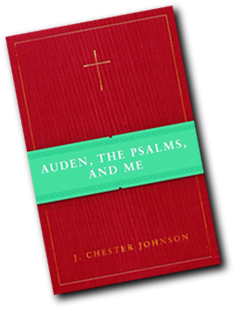April 23, 2018
The Magazine, Talisman, Recently Reviewed “Auden, The Psalms, And Me”.
The Magazine, Talisman, Recently Reviewed Auden, The Psalms, And Me. The Review Appears Below.
Mark Snow
J. Chester Johnson, Auden, the Psalms, and Me (Church Publishing, 2017) 
As the postmodern fades away together with its notion that there is no essence, no origin, no genesis to which a given word refers or which it perpetuates, it is no longer easy to argue that language is essentially fluid, not a vessel to transport the past to the future, but an unending transformation, ungrounded, too opaque and moving too fast to convey an unchanging essence in the nature of words. The journal in which this review will appear is known for its broad eclecticism and its resistance to any one poetics. The journal has generally stayed clear of theory and works that encroach on territory commonly thought to be theological. Even its well known attention to Gnosticism has been concerned principally with gnostic awareness in a secular poetics. When the editor asked that I review J. Chester Johnson’s Auden, the Psalms, and Me, I hesitated, given what I know of the journal’s history, but after reading the book closely, I realized that it embodied an argument that went far beyond its stated subject — the translation of the psalms for liturgical use within the Episcopal church. In fact, at stake was the very issue of poetic translation and the degree to which, and means through which, any translation might be judged accurate — indeed raising the question, what is meant by calling a translation “accurate.”
At stake is the translation of the psalms by Miles Coverdale, which had long been the “official” version adopted by the Episcopal Church and which were largely incorporated in the 1928 edition of the church’s Book of Common Prayer, but although Coverdale’s translations were expert poetry in English, there were instances where they diverged from the Hebrew originals and, however well they might read in English, were in that way simply wrong. Although Auden’s specific contributions to the new translation were seemingly few, his advocacy of the Coverdale translation had immense importance. Auden was a member of the Episcopal church’s drafting committee for the psalms for the Book of Common Prayer. (Johnson was his successor as a poet on the committee.) Auden was concerned with preserving the Coverdale versions, and he was not alone in advocating Coverdale, but it would seem likely that he spoke with an authority that was not easily challenged. The committee in charge of the translation include scholars focused on a precise literal translation, not necessarily on the more poetic phrasings in Coverdale.
Then what is the lesson that, in this context, Johnson’s book can teach? Is it just a tempest in a theological teapot — a conflict of marginal interest to poets in a secular world? In fact underneath the work of the Auden's position is a major question: what is it that matters more in translation: sound or “accuracy”? The same could be asked of any translation of any poetry. However the church might judge the final, published version of the translations (which in fact has been overwhelmingly positive), the underlying problem of translation will not go away. The committee was fortunate in having Auden and then Johnson among its members. After all, the translators were dealing with some of the most widely read works in any language. In any case, a literal translation, however faithful to the original, does not say what can be expressed through rhythm and sound, and what is expressed depends on matters that mere scholarship overlooks: most importantly, on how what is said is said. A poet should know that; a scholar might.

RECENT POSTS
DAMAGED HERITAGE and J. Chester Johnson on Times Square Jumbotron Dec. 21st
Damaged Heritage by J. Chester Johnson Selected for Library of Congress Shop
Damaged Heritage by J. Chester Johnson: Anti-Racism Text at St. Luke in the Fields
J. Chester Johnson's "Night" Featured by Carnegie Hill Village
J. Chester Johnson Named To Board of Advisors For Poetry Outreach Center
Conversation Among Descendants of the Elaine Race Massacre 104 Years Later: Zoom Recording Available
J. Chester Johnson Interviewed by Tavis Smiley
Cornelius Eady's Interview of J. Chester Johnson for Poets House/WBAI "Open House" Program
NPR Article on Elaine and Tulsa Race Massacres
Favorable Review of "Damaged Heritage" in Current Issue of American Book Review
Damaged Heritage Placed On Selective Goodreads’ List of Best Nonfiction Books
Damaged Heritage Motivates Nationwide Talks on Social Justice and Racial Equity
J. Chester Johnson Writes in the ARKANSAS TIMES About Another Arkansas Race Massacre
ARCHIVES
December 2024
October 2024
April 2024
March 2024
October 2023
August 2023
April 2023
January 2023
December 2022
September 2022
April 2022
October 2021
September 2021
August 2021
March 2021
December 2020
October 2020
July 2020
June 2020
May 2020
January 2020
December 2019
October 2019
September 2019

